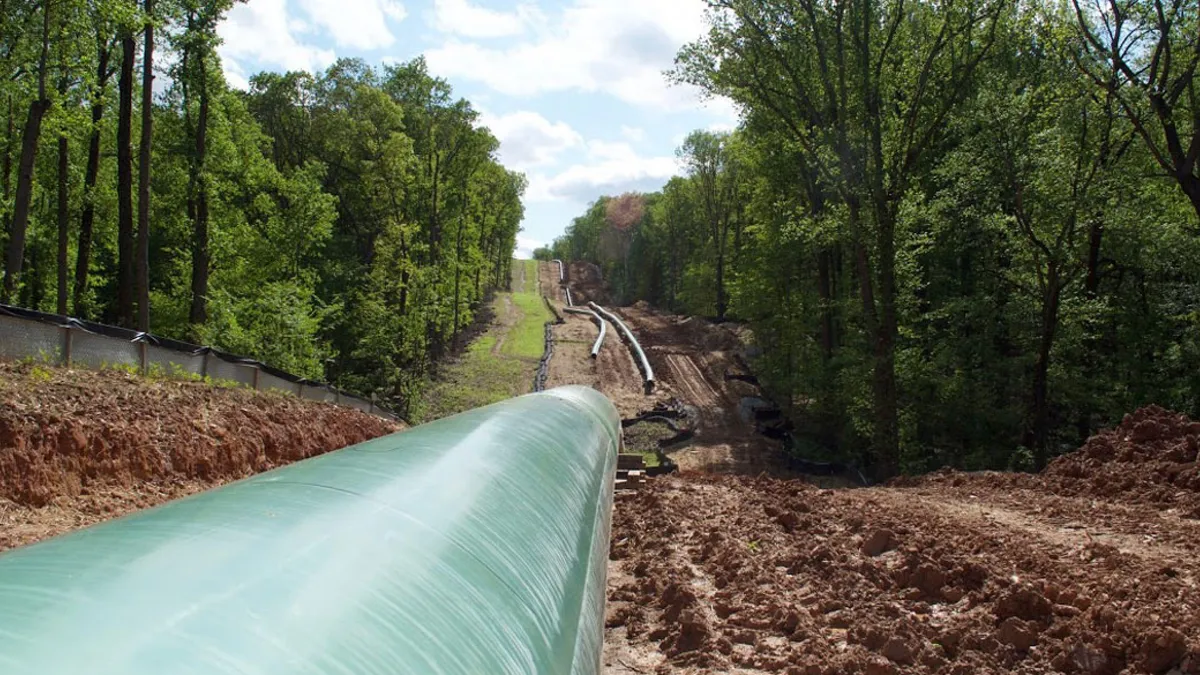Dive Brief:
-
The Federal Energy Regulatory Commission on Monday allowed owners of the Atlantic Coast Pipeline (ACP) to resume construction after a court ruling put a pause on the project for more than a month.
-
In August, a federal appeals court threw out construction permits for the 600-mile pipeline, ruling that they were based on a faulty right-of-way through national park lands in Virginia. In response, FERC halted all construction on Aug. 13 until the pipeline could be rerouted.
-
Last week, the National Park Service issued a new right-of-way for the pipeline, and on Monday FERC sent a letter to the owners saying construction could continue. Environmental groups opposed to the project used the pause to file new court challenges, which are pending.
Dive Insight:
The ACP's construction timeout is a reminder of how difficult siting new gas infrastructure in the U.S. can be, and could give opponents another opening to challenge the controversial project.
Approved in a 2-1 FERC vote last year, the $6 billion ACP would deliver gas from West Virginia production fields to demand centers in Virginia and North Carolina. It is owned jointly by electric utilities Dominion Energy, Duke Energy and Southern Co.
Opponents of the project challenged the pipeline in court, saying that construction permits awarded by the National Park Service ignored how tree clearing would impact the scenic and conservation goals of the Blue Ridge Parkway, a nearly 500-mile road that runs through Virginia and North Carolina.
The Fourth Circuit Court of Appeals agreed last month, ruling the NPS decision on Blue Ridge "is not accompanied by any explanation, let alone a satisfactory one."
On Sept. 14, the Park Service issued a new right-of-way permit for the line, satisfying FERC's criteria to resume building.
"Construction activities along project areas which had previously received a notice to proceed may now continue," the commission wrote to the owners Monday.
During the construction pause, environmental groups filed a broad legal challenge at the fourth circuit, questioning the underlying need for the ACP — a critique made by Democrats at FERC.
Last year, Democratic Commissioner Cheryl LaFleur raised the issue of project need in her dissent against the ACP's approval, saying that both it and the Mountain Valley Pipeline, a separate project approved the same day, "appear to be receiving gas from the same location, and both deliver gas that can reach some common destination markets."
Like ACP, the Mountain Valley Line had to stop construction after a court questioned its route across federal lands. FERC staff allowed building to resume at the end of August.
LaFleur and fellow Democrat Commissioner Richard Glick criticized FERC for allowing construction to continue on Mountain Valley through a staff decision, rather than having sitting regulators decide.
No such statement accompanied the ACP construction announcement Monday, but the Democrats have other ways to oppose the project.
Last month, Glick abstained from a vote denying rehearing on the pipeline with the expressed intent of allowing legal challenges against the project to move forward. Because the five-member commission currently has one vacancy, voting for rehearing would have deadlocked the agency, halting the court cases.
Later in the month, Glick told Utility Dive the move was part of a strategy to assist nonprofit organizations and citizen groups that often file suits against energy infrastructure projects.
"Quite frankly some of these appeals ... are brought by folks without a lot of resources," he said. "I think some do better than others in filing their briefs and I think in some cases the court could use extra help."













